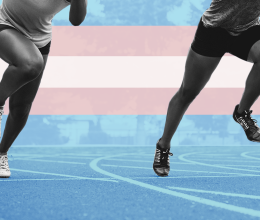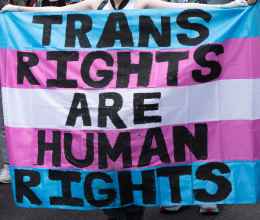PORTLAND – In a victory for the privacy and dignity of transgender students, the Maine Supreme Judicial Court todayruled that a school district violated the Maine Human Rights Act (MHRA) when it required a transgender girl to use a separate bathroom rather than the bathroom used by all other female students. The ACLU of Maine and the national ACLU LGBT Project filed an amicus brief in the case, arguing for the importance of protecting minorities from discrimination, especially in situations where there is public controversy.
“Schools have a responsibility to create an environment free from discrimination, where students are able to learn and grow. All the parties in this case agreed - and the Court todayrecognized - that Susan Doe is a girl. As such, she has the right to use the girl’s bathroom," said Zachary Heiden, Legal Director at the ACLU of Maine. "This is an important victory for the Maine Human Rights Act, and for the dignity of all transgender people in Maine.”
Asa Adams Elementary School in Orono terminated Susan’s use of the girls’ bathroom after a male student twice followed her into the bathroom claiming that he, too, had a right to use the girls’ bathroom. Susan was then required by the school to use the single-stall, unisex staff bathroom. She was the only student instructed to use the staff bathroom.
In 2008, Susan’s parents and the Maine Human Rights Commission filed a lawsuit against RSU 26 on Susan’s behalf, claiming unlawful discrimination in education and unlawful discrimination in a place of public accommodation on the basis of gender identity and expression, in violation of the MHRA. In 2012, the Maine Superior Court sided with RSU 26, granting the defendants’ motion for summary judgment. Today, the Supreme Court overturned that ruling 5 to 1.
According to the majority opinion, “Decisions about how to address students’ legitimate gender identity issues are not to be taken lightly. Where, as here, it has been clearly established that a student’s psychological well-being and educational success depend upon being permitted to use the communal bathroom consistent with her gender identity, denying access to the appropriate bathroom constitutes sexual orientation discrimination in violation of the MHRA.”
This is the first case that has required the Court to interpret the MHRA’s prohibition on discrimination based on gender identity and expression in public accommodations, educational opportunities, employment, housing, and other areas.
Susan and her family were represented by Gay & Lesbian Advocates & Defenders (GLAD) and ACLU of Maine board member Jodi Nofsinger of Berman & Simmons, P.A.
The court decision is available here:http://www.aclumaine.org/media/793








